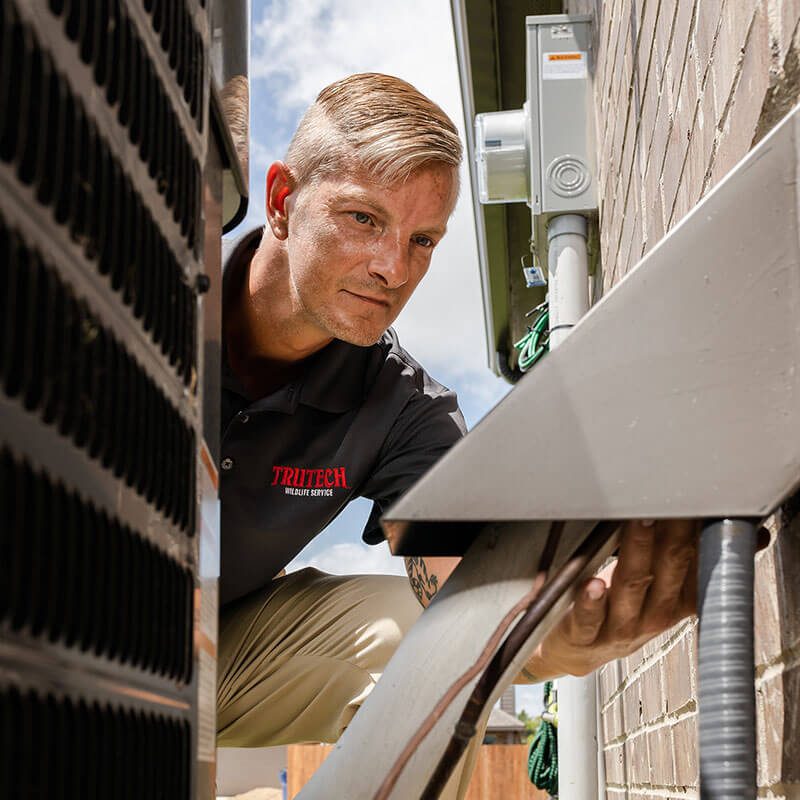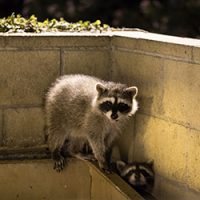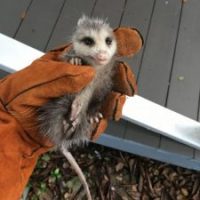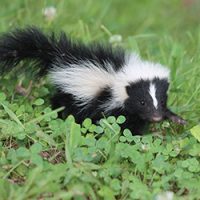Boston Wildlife Removal
Some Geographic Restrictions
Nuisance Wildlife in Boston, MA
As the capital city of Massachusetts, Boston is a large city with a sprawl that stretches into the surrounding areas. The city lies on the Atlantic coast with two major rivers flowing out into the well-trafficked harbor.
Boston has grown to overtake a land that was originally a hilly peninsula with marshy swamps connecting it to the mainland. Although development of the city has led to the destruction of natural habitat, many critters continue to call Boston home. As they seek out food and shelter, it is not uncommon for a wild animal to make its way into your home.
A few of the most common offenders of invading your home include bats, skunks, raccoons, rodents, opossums, and birds. Unfortunately, any of these creatures can lead to significant property damage in the form of damaged wiring, soiled insulation, and cracked drywall. In addition to the potential for damage, these critters also bring a health threat to your home. With many of these animals capable of carrying dangerous diseases, it is critical to remove the threat as soon as possible.
The cold winters and warm summers lead to many homeowners finding unwelcome house guests invading their home in the spring, summer, and fall months. But it’s not impossible for a cold creature to make their way into your warm home during the winter.
Typically, you’ll hear strange noises or notice droppings as the first sign of an infestation. Give Trutech a call if you see any signs. A trained Trutech technician can help you identify the animal and implement a long-term prevention strategy for your home.
Wildlife We Remove in Boston, MA
Boston Wildlife Removal Services
Step 1: Inspection
When a Trutech technician arrives at your home, we will start by asking questions about your experience with the nuisance wildlife at hand. Once we have a firm grasp on the issues facing the property owner, a thorough inspection of the interior and exterior of the home begins. This includes looking at the attic, crawlspace, roof, and any possible entry points. Since each species and home is different, the length of the inspection can vary. It can take between 30 minutes to 3 hours to accurately evaluate the extent of the wildlife nuisance issue.Step 2: The Plan
With the results of the inspection, we share our findings with you. And share how we will solve the problem for you. Although each wildlife control plan is unique to the home, it may include live trapping, direct capture, one-way doors, or deterrents. Before any work begins, we make sure that you are comfortable with the steps being taken to resolve the nuisance wildlife issue.Step 3: Get To Work
If you approve of the plan, we will set up a time to put it into place. After the animal removal has taken place, we will repair any damage caused by the critter. Additionally, we will apply sanitizing and ectoparasite agents to the affected areas. Once the plan is executed, your home will be returned to its normal condition.Step 4: Exclusions
Wildlife removal is just one part of the plan. All plans include wildlife control measures to prevent any future problems. This is often completed by implementing a full home exclusion. The goal is to create physical barriers to prevent animals from entering your home in the future. A few possible exclusion techniques include gable vents, ridge vents, crawlspace vents, roof returns, and plumbing stacks. With the appropriate exclusions in place, you can rest easy knowing that a long-term solution is in place to protect your home from nuisance wildlife.Guarantee and Warranty
Once installed, Trutech offers a one-year warranty on full home exclusions. Plus, there is a 100% satisfaction guarantee. If you aren’t satisfied with the initial work, Trutech will send out a service manager to inspect the work completed and make any necessary adjustments.
Some Geographic Restrictions
Wildlife Control in Greater Boston
Raccoon Removal
Raccoons inhabit all parts of greater Boston. They tend to stay near a reliable source of water and are comfortable in urban areas. They can cause a mess of garbage and destroy home gardens and birdfeeders.
Raccoons can cause significant damage by gaining entry to your home and by creating a den in your attic. Raccoon mating season generally happens from January to March in Boston. After a 63-day gestation period, you’ll hear raccoons and their cubs in April or May. The most common sign of raccoons is hearing them at night. Typical raccoon sounds are thumping, scurrying, purring, growling, chittering, and whining.
Live trapping is the most common removal technique. Scented deterrents do have limited effectiveness. Ful exclusions are necessary for raccoon control because the animal can leave large holes in its wake.
Rodent Removal
Rats and mice are a year-round problem in Boston, but they can especially be a problem in spring. The house mouse and Norway rat are the most common rodents in the Boston area. The Norway rat tends to live within 150 feet of food and a water source making a Boston home a perfect habitat.
Warmer than average winters can allow for a longer reproduction cycle for rats and mice. Rats can have up to seven litters a year; a mouse can have between five to ten litters a year. One rodent can become hundreds if left unchecked.
Professional rodent pest control not only traps rats and mice but also controls the entire population. Our technicians strategically place traps in high-traffic areas. The trapping period typically takes seven to ten days. A whole-home exclusion identifies all current and potential rodent entry points and seals them. Rats and mice can create their own entry holes. Trutech’s rodent control program makes sure your house stays rat and mice-free.
Bat Removal
All nine species of bats in Massachusetts eat insects. Five species are listed as endangered, but all bat species are protected.
A bat does not want to be in your home. If you find one in a room, do not panic. Seal the room and open a window. Attics are another story. Attics provide all the necessary criteria for a safe habitat for a bat colony.
Humane bat removal consists of sealing all entry points and install a one-way bat valve, but there are restrictions when bat colony in your attic can be evicted. Bats can only be removed in May after hibernation or between August 1 and October 15 after the pups have learned to fly.
Humane bat removal consists of sealing all potential entry points and installing a one-way bat valve.
Skunk Control
Skunks are the most common mammal found throughout most of Massachusetts. Skunks typically come out in your yard in Boston from February to March. You’ll notice a skunk problem from the smell. A female will spray a male to thwart his advances.
Skunks are attracted to yards that provide shelter and food. A skunk’s diet typically consists of insects like grasshoppers, bees, beetles, and crickets. Skunks are docile mammals and can help manage pests in your yard.
The greatest threat people and pets face is the spray from a skunk. To avoid a skunk’s spray rely on professional handling and skunk trapping. Removing food supplies is one of the most effective ways to prevent a skunk from entering your property.
Sheds, porches, and foundations make ideal burrowing locations. A skunk burrow can lead to structural damage. Exclusion techniques like barriers can stop a skunk from creating a den under your house.
Squirrel Removal
Gray and red squirrels inhabit the entire state of Massachusetts. Southern flying squirrels will also enter your home and attic. Gray squirrels are comfortable around humans and are found in urban and suburban environments. Red squirrels are usually found in mature coniferous forests or small pine plantations in suburban areas. Squirrels are most active during dawn and dusk except in winter they are active in the middle of the day.
If you hear scratching noises that start early in the morning, it is likely a squirrel. Squirrels damage your home by constantly gnawing, building nests, and leaving their droppings.
Effective squirrel control includes trapping, removing, and preventing squirrel infestations. Because trapped squirrels must be released on the premises within the property, effective exclusion work is essential to keep the squirrels out.
Bird Control
The most common nuisance birds in Boston are gulls, pigeons, sparrows, starlings, swallows, and woodpeckers.
Depending on the problem, the species, and property type will determine the type of bird control we use. Typical bird species that cause problems include pigeons, woodpeckers, sparrows, starlings, swallows, and gulls.
Homeowners typically experience birds nesting in chimneys, gutters, or vents.
Commercial properties like retail centers, grocery stores, medical centers, and factories usually face problems from pigeons and gulls. For large areas, habitat modifications, exclusions and deterrents work well to manage large flocks.
Deterrents, repellents, exclusion, and occasionally trapping can be used to manage a bird problem.
Who We Are
When you encounter unwanted wildlife in your home or business it is important to resolve the problem quickly and professionally. At Trutech, our expert technicians and specialists have spent over 40 years developing and training to provide humane wildlife service.
Technicians have local knowledge of the town they live and work in. As an experienced wildlife control company, we know how to protect you and your family from the hazards of wildlife in your home or place of business.
And we’re not satisfied until you are and that is 100% guaranteed. Our goal is a long-term solution to your wildlife problem. Our full home exclusions are always guaranteed for one year.
When you work with the wildlife removal professionals at Trutech, you can feel confident that the job is being done right. We handle pests large and small, dangerous and docile, so you can reclaim your property from common pests and nuisance.
Some Geographic Restrictions


Frequently Asked Questions
There is no one-size-fits-all solution; each job requires a custom approach. We inspect every home and build a custom plan to resolve any wildlife problems. We use a variety of techniques including cage traps, direct capture, one-way valves, and deterrents. Exclusion techniques are the most effective way to get rid of animals.
We provide customized solutions to each individual customer so that we may solve the issue as quickly, efficiently, and cost-effectively as possible. The size of the house, type of animal, number of nuisance animals, and length of time of infestation affect the estimated price of wildlife removal.
An estimate may change based on the amount of animal activity or work needed to be done. All estimates are finalized with an exact price before any work begins.
Our goal is to remove any wildlife as humanely as possible — often that means catching and releasing the animal.
Trutech® does not hire subcontractors for animal removal services. We employ expert technicians who are provided ongoing education and training in all aspects of animal control and removal. Many of our technicians hold degrees in Wildlife Biology, Entomology (insects), Ornithology (birds) or Herpetology (reptiles), some with Masters degrees in their specialty field.
Yes! We are licensed and insured.
We start by first removing the wildlife on your property, and cleaning up any damage. From there we’ll work with you to create a customized prevention plan so you won’t have the same issue again.
Typically an animal dies in your home because it became trapped in a hard-to-reach and hidden area. Our expert technicians have the experience and knowledge to find it and then safely remove the carcass from your home.
Our Wildlife Technicians use a pet-safe odor eliminator made of natural organisms and enzymes that consume decaying organic odor-causing matter, eliminating the source of the lingering odor. We use aerosols, oxidizing agents, foggers, and disinfectants with germicides to deodorize until nature completes this task for you.
You should consider a full home exclusion after the smell has been neutralized. Nuisance wildlife found its way into your house once. That entrance leaves your home vulnerable to future animal infestations. Full home exclusions are the most effective form of wildlife control.
Service Areas
- Newton
- Waltham
- Waterfront
- Quincy
- Cambridge
- Charlestown
- Beacon Hill
- North End
- West End
- West Roxbury
- Jamaica Plain








